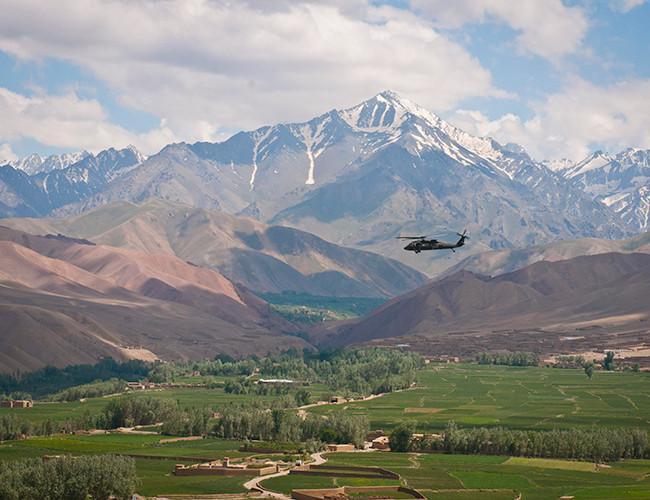
‘In Search of the Lost Orient: An Interview’ by Olivier Roy, as interviewed by Jean-Louis Schlegel, translated by C. Jon Delogu (Columbia University Press, $35, 272 pages)
The title of this “autobiographical memoir” of French scholar Olivier Roy is quite misleading. There are few less naively orientalist intellectuals than Roy, who has long prized deep research on political Islam that eschews easy answers. But there are still hints of Indiana Jones throughout the book.
 Roy has lived a frenetic life, combining scholarship with a semi-detached relationship to the French state and intrepid adventures in Afghanistan and Central Asia. The material details of his life are at the center of the volume, which takes the form of a lengthy question-and-answer session between Roy and Jean-Louis Schlegel of the French magazine Espirit. The book touches only briefly on Roy’s best known intellectual convictions. Instead the focus is largely on his action-packed life and how his experiences have shaped his thinking.
Roy has lived a frenetic life, combining scholarship with a semi-detached relationship to the French state and intrepid adventures in Afghanistan and Central Asia. The material details of his life are at the center of the volume, which takes the form of a lengthy question-and-answer session between Roy and Jean-Louis Schlegel of the French magazine Espirit. The book touches only briefly on Roy’s best known intellectual convictions. Instead the focus is largely on his action-packed life and how his experiences have shaped his thinking.
There are plenty of inadvertently amusing sections (sample passage: “Most of our class was half hippy, half egghead and crazy about India and its languages. But there was also Count Francois de Vaux de Foletier with his cane and signet ring. This archivist, a graduate of the Ecole nationale des chartes and author of a thesis on Galoit de Genouillac (the French artillery commander at the Battle of Marignano in 1515, as everyone knows), was also the president of the 1901 association Friends of the Romany.”) But perhaps the most interesting parts are those where he links reflections on his university years in far leftist circles in France in the 1960s and 70s with later observations of radical jihadists.
He constantly returns to similarities in reasoning between Islamists and leftists of his generation, with the extremes of both groups tipping into violence. “I quickly realized how, when young, once could become radicalized to an absurd degree under the spell of … the powerful group dynamic,” he reflects at one point. Radical circles, he suggests, mix “schizophrenia with a little paranoia in their relations with the real society – a cocktail that could very easily lead to terrorism. Those experiences would help me later to understand the logic of the young people joining al-Qaeda.” Both the leftist circles of his youth and the mujahedeen fighters he met in Afghanistan obsess over “sacrifice, fusion into a powerful mass, humiliating mockery of the individualism of the petit bourgeois, and ultimately death.”
These ideas will be familiar to readers of Roy’s work. He has consistently argued that jihadism is more a question of “generational revolt” than a theological crisis – an “Islamization of radicalism” rather than a “radicalization of Islam.” In “Jihad and Death,” published earlier this year, Roy carefully studied the backgrounds of individuals who have carried out jihadi terror attacks in Europe, concluding that Islamic extremism is as much a psychological problem as it is a social or religious problem.
Roy’s work is more prominent and influential in the Francophone world than the Anglophone world. But one of the key themes that comes through this book is a constant, rather un-French emphasis on empiricism and suspicion of theory. He spent most of the 1980s in Afghanistan, researching among the mujahedeen after the Soviet invasion, “gather[ing] empirical data and analyses that would form the basis of my writings for a long time to come.” He is keen to stress that he “avoided starting from a conceptual model and a methodology defined in advance by the social sciences and instead privileged direct contact … One has to return to individuals, to the actors involved, and investigate their itineraries. One has to go back out into the field.”
This is partly why he dismisses grand narratives about a “revolt of the oppressed,” the “war on terror” or the “false essentialization of an imaginary Muslim world.” He criticizes both “the parrots who speak of a clash of civilisations and those who talk about postcolonial resentment [for] understanding nothing about the radical changes throughout the Muslim world, its fracturing, its globalisation, and especially its secularisation in the wake of an apparent wave of Islamization.” When he hits his stride, Roy’s conclusions are as thrilling as his life.
Glimpses of these insights come through “In Search of the Lost Orient.” But mostly the book is a dizzying account of an enviably adventurous life. For an “intellectual autobiography,” it is almost indecently swashbuckling and action-packed.
* Follow the Turkey Book Talk podcast via iTunes here, Stitcher here, Podbean here, or Facebook here, or Twitter here.